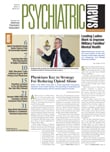APA has praised a new White House plan to curtail prescription drug abuse that would, for the first time, require physicians to receive specialized training in prescribing long-acting and extended-release opioids.
On April 19 the Obama administration brought together the heads of several government agencies to mark the release of a coordinated federal plan to deal with the nation's growing prescription drug abuse epidemic. APA, the American Academy of Addiction Psychiatry (AAAP), and the American Osteopathic Academy of Addiction Medicine (AOAAM) released a joint press release on April 21 applauding the administration's efforts.
White House Director of National Drug Control Policy Gil Kerlikowske was joined by Assistant Secretary for Health and Human Services Howard Koh, M.D., Food and Drugs (FDA) Commissioner Margaret Hamburg, M.D., and Drug Enforcement Agency Administrator Michele Leonhart in releasing "Epidemic: Responding to America's Prescription Drug Abuse Crisis," which details the new expansion of the National Drug Control Strategy.
Under the plan the FDA would require drug manufacturers to develop education programs for prescribers to help them identify, treat, and end dependence on prescription drugs. The plan notes that while there are a number of classes of prescription drugs that are abused, it "primarily focuses on the growing and often deadly problem of prescription opioid abuse."
The document stresses that "prescription drug abuse is the nation's fastest-growing drug problem." While the abuse of illegal street drugs, such as cocaine, has declined, the number of prescription drug abusers has risen markedly. "Data from the National Survey on Drug Use and Health (NSDUH) show that nearly one-third of people aged 12 and over who used drugs for the first time in 2009 began by using a prescription drug nonmedically."
In an interview with Psychiatric News, John Renner, M.D., chair of APA's Council on Addiction Psychiatry, said that the plan reflects a shift in emphasis for federal drug policy. He noted that illicit-drug distribution has moved from dealers to friends and relatives, and ultimately the prescribers.
In the joint press release Joseph Liberto, M.D., AAAP president, said, "The administration's action plan to address the growing problem of prescription drug abuse in our nation, especially among our youth, is an unprecedented step forward in helping to reduce the morbidity and mortality associated with addiction. Essential elements of the plan include a call to require training of our health care workforce on the appropriate use of opioid medications and the call to strongly recommend provider education on early identification and treatment of substance use disorders. This is consistent with the educational missions of AAAP, APA, and AOAAM."
Renner noted that "this is the first time that there is recognition that physician prescribing is part of the problem and that the need for better education of doctors is paramount."
At the heart of the plan is the requirement that drug manufacturers provide educational programs to those licensed to prescribe long-acting and extended-release opioids. In addition, manufacturers would be required to provide materials to assist physicians in counseling patients in the proper use and risks of these drugs.
In support of the plan, the FDA moved forward with requirements and guidelines for risk evaluation and mitigation strategies (REMS). The FDA has the authority to require manufacturers to develop REMS under the Food and Drug Administration Amendments Act of 2007. According to the plan, the REMS would require manufacturers "to develop effective educational materials and initiatives to train practitioners on the appropriate use of opioid pain relievers" and require them "to develop effective materials for patients on the appropriate use and disposal of opioid pain relievers." At this point physician training is not mandatory; however, companies have 120 days to issue draft REMS with the goal of putting them into effect in early 2012.
Another component of the plan is better tracking of where and how patients are obtaining their drugs. The plan calls for an improved national system to track prescribing habits of physicians and the habits of patients in seeking these prescriptions.
In addition, the plan also takes note of the great benefits these drugs provide and seeks to strike a balance between controlling abuse and ensuring adequate access for those in legitimate need. The plan states that the "potent medications science has developed have great potential for relieving suffering, as well great potential for abuse. There are many examples: acute medical pain treatment and humane hospice care for cancer patients would be impossible without prescription opioids; benzodiazepines are the bridge for many people with serious anxiety disorders to begin the process of overcoming their fears; and stimulants have a range of valuable uses across medical fields."
